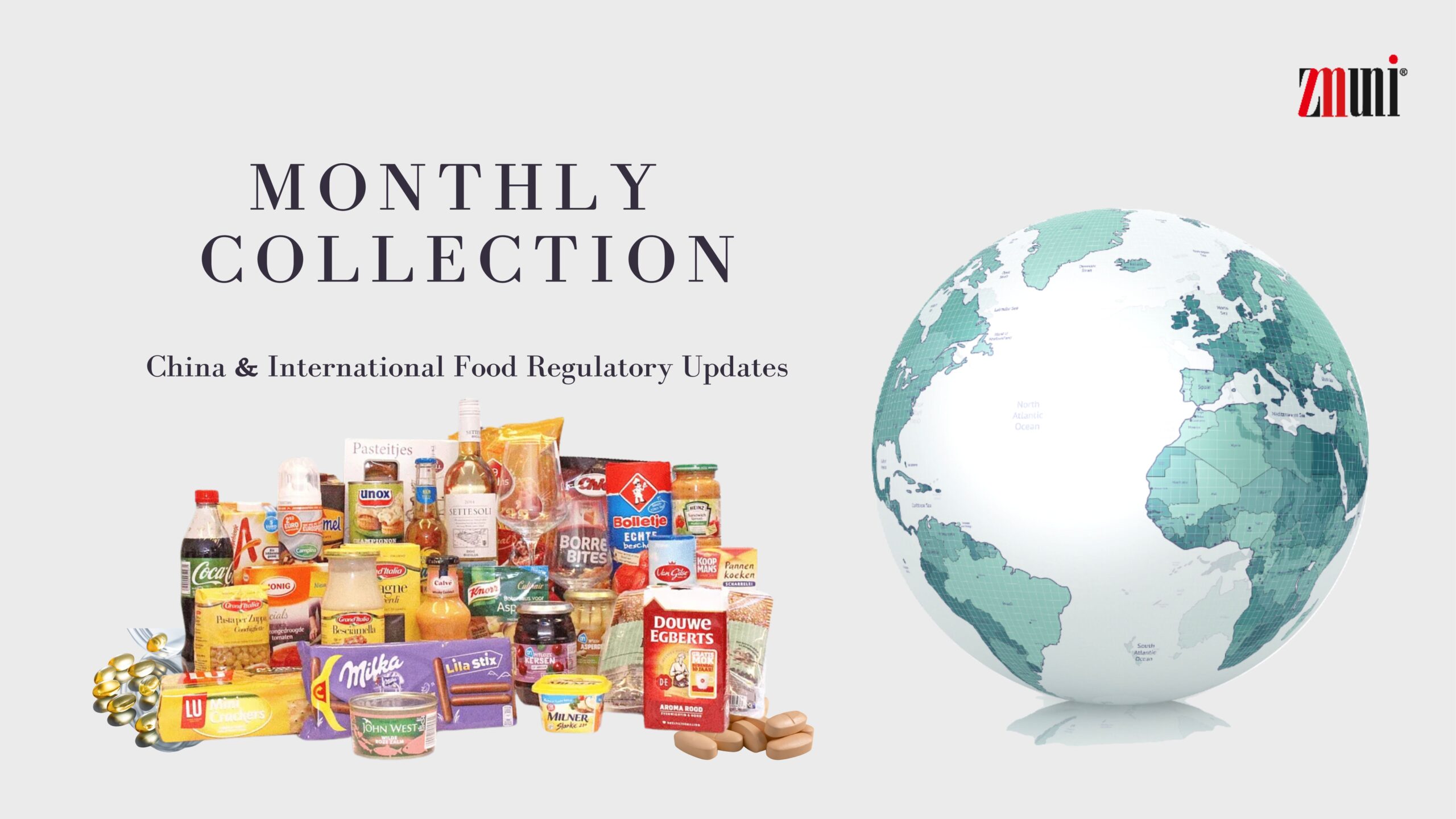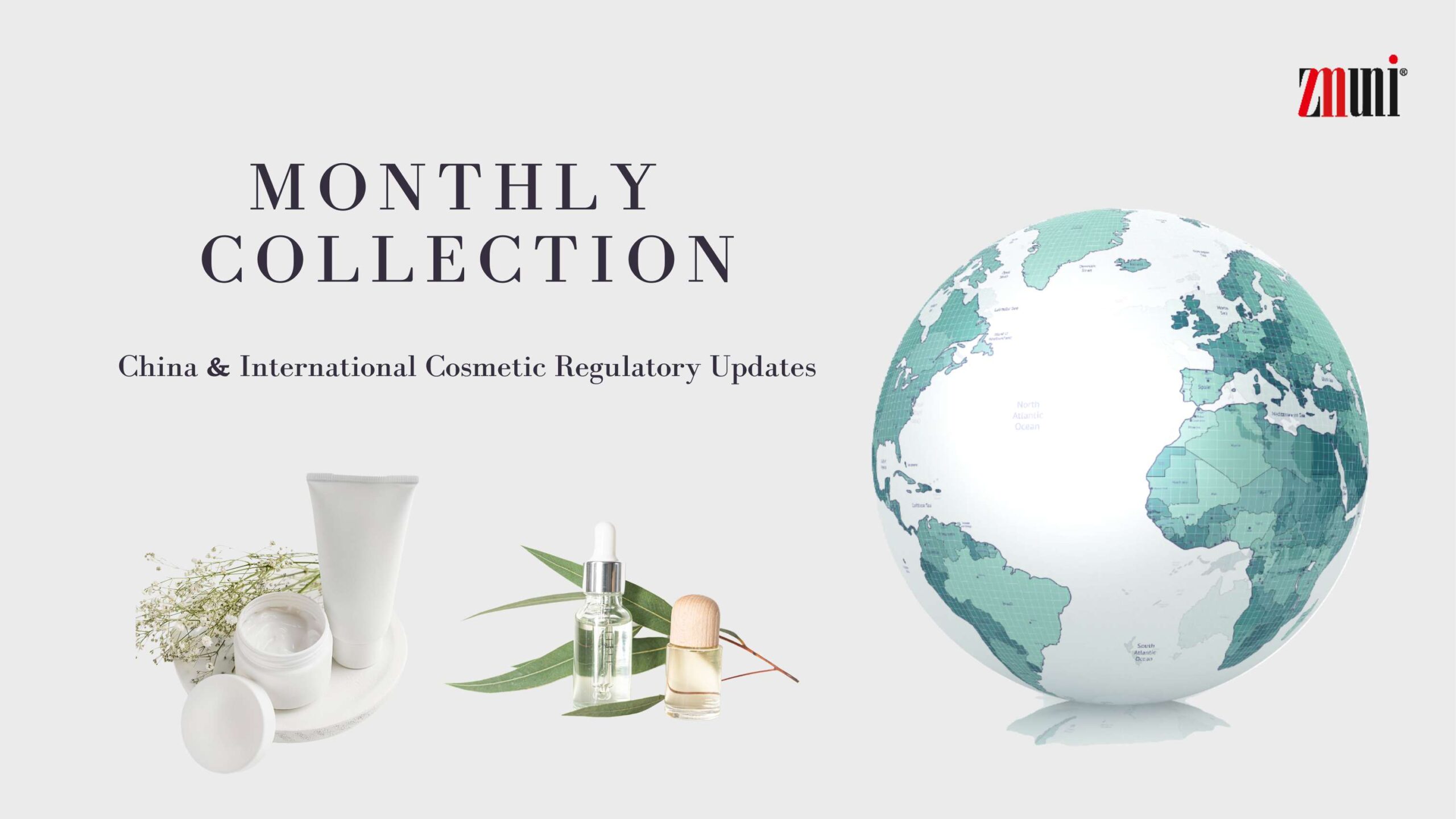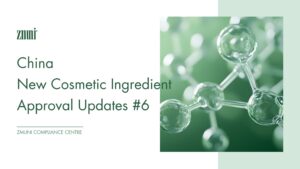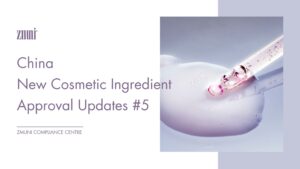+86 571 8659 2517
+86 180 5841 8258
info@zmuni.com

This article summarizes the regulatory developments related to food within China and internationally in April 2025, with an emphasis on updates in regulations concerning new food ingredients, food additives, feed additives, and health foods. China Food Regulatory Updates Special Food In April 2025, the National Technical Committee on Standardization of Special Foods (TC466) released eight national standards for health foods. They are: "Determination of Pantothenic Acid in Health Foods" (GB/T 22246-2025) "Determination of Inositol in Health Foods" (GB/T 45242-2025) "Determination of Thiamine, Riboflavin, Pyridoxine, Niacin, Nicotinamide and Caffeine in Health Foods" (GB/T 45243-2025) "Determination of Icariin in Health Foods"

The global cosmetics regulatory environment continues to evolve. To help businesses stay updated with regulatory changes, ZMUni Compliance Center regularly releases a monthly recap of global cosmetics regulations. This article covers the regulatory developments related to cosmetics within China and globe in April 2025, with an emphasis on updates in cosmetic ingredient, cosmetic safety assessment, labeling, etc. China Cosmetic Regulatory Updates New Cosmetics Ingredients (NCI) Notification In April 2025, 16 new cosmetic ingredients were notified with the China National Medical Products Administration (NMPA). They include: The technical requirements for the 16 new cosmetic ingredients mentioned above have not been disclosed, and they have

On April 30, 2025, China National Medical Products Administration (NMPA) issued a new supplementary testing method: BJH 202501 Determination of Meprednisone in Cosmetics. This method outlines the qualitative and quantitative analysis of Meprednisone (CAS No.1247-42-3) in various categories of cosmetics, such as liquid (water, oil), cream and milk, gel, and wax-based products. Meprednisone is a type of glucocorticoid, with common derivatives including methylprednisolone acetate and related compounds. Glucocorticoids and their by-products are known for their skin-lightening and anti-allergic properties. When added to cosmetics, these substances can significantly enhance effects such as acne reduction, anti-inflammation, pigmentation fading, and whitening. However, prolonged use may

On April 18, 2025, China's General Administration of Customs (GACC) published its list of non-compliant imported food products for March 2025. A total of 231 batches from 40 countries and regions were denied entry, marking a 13.5% decrease compared to the previous month and an 8.0% decline year-on-year. Significantly, this is the fourth consecutive month of decline since the number of rejected imports peaked in November 2024. Analysts suggest the downward trend may be influenced by external factors, including adjustments to U.S. tariff policies. The majority of non-compliant imports came from the U.S. (23%), Spain ranked second (9.1%), Brazil (8.2%), and

Recently, South Korea's National Assembly officially passed the Synthetic Biology Promotion Act, making it the first country in the world to enact legislation specifically dedicated to the field of synthetic biology. The law will come into effect in 2026, following cabinet approval and promulgation, after a one-year preparation period. To ensure smooth implementation, the South Korean government plans to simultaneously advance supplementary legislation, including enforcement decrees and relevant guidelines. Synthetic biology is regarded as a cutting-edge field that integrates artificial intelligence, big data, and life sciences. It has wide-ranging applications in areas such as vaccine

If you would like to gain a clearer and more comprehensive understanding of the management of cosmetic ingredients in China, we invite you to explore our previous article, Cosmetic Ingredients in China: Your Guide to the Latest Compliance Requirements. It provides helpful insights to build a solid foundation before diving into this topic. From April 22 to 28, 2025, 7 new cosmetic ingredients were notified with the China National Medical Products Administration (NMPA). They include: The technical requirements for the 7 new cosmetic ingredients mentioned above have not been disclosed, and they have not yet entered the safety monitoring period.

On April 24, 2025, China's State Administration for Market Regulation (SAMR) issued a public consultation on the draft "Catalog of Permitted Health Claims for Health Foods: Aids in Maintaining Joint Health." Stakeholders are invited to submit their feedback by June 2, 2025 This marks the first new health function proposed to be included in the official health claim catalog since the issuance of the “Implementation Rules for the Evaluation of New Health Functions and Product Technologies of Health Foods (Trial)”. The newly proposed function, “aids in maintaining joint health,” encompasses several specific benefits, including alleviating joint pain and

To help overseas companies stay up to date with cosmetic ingredient trends in China, ZMUni Compliance Centre will publish a regular series on New Cosmetic Ingredient (NCI) notifications. We hope this provides valuable insights for ingredient suppliers and brands looking to enter the Chinese market. From April 11 to 21, 2025, 2 new cosmetic ingredients were notified with the China National Medical Products Administration (NMPA). They include: Ingredient Name in CN Notification No. Notifier in CN 透明质酸水杨酸酯钠 202500035 华熙生物科技股份有限公司 N-乙酰基-丝氨酰-脯氨酰-缬氨酰-异亮氨酰-缬氨酰-脯氨酰胺 202500036 北京茂思商贸有限公司 The technical requirements for the 2 new cosmetic ingredients mentioned above have not been disclosed, and they have not
+86 571 8659 2517
+86 180 5841 8258
info@zmuni.com